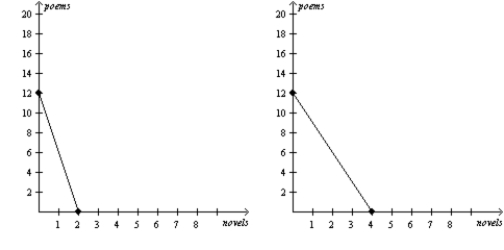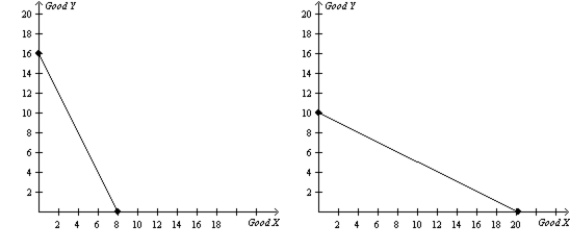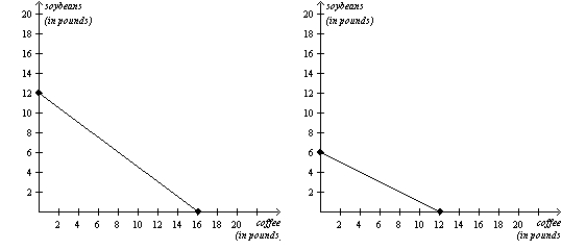Exam 3: Interdependence and the Gains From Trade
Exam 1: Ten Principles of Economics438 Questions
Exam 2: Thinking Like an Economist620 Questions
Exam 3: Interdependence and the Gains From Trade527 Questions
Exam 4: The Market Forces of Supply and Demand700 Questions
Exam 5: Elasticity and Its Application598 Questions
Exam 6: Supply, Demand, and Government Policies648 Questions
Exam 7: Consumers, Producers, and the Efficiency of Markets550 Questions
Exam 8: Application: The Costs of Taxation514 Questions
Exam 9: Application: International Trade496 Questions
Exam 10: Externalities522 Questions
Exam 11: Public Goods and Common Resources434 Questions
Exam 12: The Costs of Production420 Questions
Exam 13: Firms in Competitive Markets543 Questions
Exam 14: Monopoly637 Questions
Exam 15: Measuring a Nations Income522 Questions
Exam 16: Measuring the Cost of Living545 Questions
Exam 17: Production and Growth507 Questions
Exam 18: Saving, Investment, and the Financial System567 Questions
Exam 19: The Basic Tools of Finance513 Questions
Exam 20: Unemployment699 Questions
Exam 21: The Monetary System518 Questions
Exam 22: Money Growth and Inflation487 Questions
Exam 23: Aggregate Demand and Aggregate Supply563 Questions
Exam 24: The Influence of Monetary and Fiscal Policy on Aggregate Demand512 Questions
Select questions type
Suppose there are only two people in the world. Each person's production possibilities frontier also represents his or her consumption possibilities when
(Multiple Choice)
4.8/5  (27)
(27)
Table 3-20
Assume that Brad and Theresa can switch between producing wheat and producing beef at a constant rate.
 -Refer to Table 3-20. What is Brad's opportunity cost of producing one pound of beef?
-Refer to Table 3-20. What is Brad's opportunity cost of producing one pound of beef?
(Multiple Choice)
4.9/5  (34)
(34)
Table 3-37
Assume that Aruba and Iceland can switch between producing coolers and producing radios at a constant rate.
 -Refer to Table 3-37. Aruba should export
-Refer to Table 3-37. Aruba should export
(Multiple Choice)
4.8/5  (38)
(38)
Table 3-15
 -Refer to Table 3-15. Which of the following combinations of meat and potatoes could the rancher not produce in 40 hours?
-Refer to Table 3-15. Which of the following combinations of meat and potatoes could the rancher not produce in 40 hours?
(Multiple Choice)
4.9/5  (51)
(51)
Suppose the U.S. and Japan can both produce airplanes and televisions and the U.S. has a comparative advantage in the production of airplanes while Japan has a comparative advantage in the production of televisions. Also suppose the U.S. has an absolute advantage in the production of both airplanes and televisions. The U.S. should
(Multiple Choice)
5.0/5  (41)
(41)
Jennifer takes 2 hours to make a loaf of bread and 1 hour to make a dozen cookies. Janet takes 3 hours to make a loaf of bread and 3/4 hours to make a dozen cookies. Who, if either, has an absolute advantage baking bread? Who, if either, has an absolute advantage making cookies?
(Essay)
4.8/5  (33)
(33)
When describing the opportunity cost of two producers, economists use the term
(Multiple Choice)
4.9/5  (43)
(43)
Table 3-23
Assume that the farmer and the rancher can switch between producing pork and producing tomatoes at a constant rate.
 -Refer to Table 3-23. Assume that the farmer and the rancher each has 24 labor hours available. If each person spends all his time producing the good in which he has a comparative advantage and trade takes place at a price of 1 pound of pork for 2 pounds of tomatoes, then
-Refer to Table 3-23. Assume that the farmer and the rancher each has 24 labor hours available. If each person spends all his time producing the good in which he has a comparative advantage and trade takes place at a price of 1 pound of pork for 2 pounds of tomatoes, then
(Multiple Choice)
4.9/5  (36)
(36)
Figure 3-15
Perry's Production Possibilities Frontier Jordan's Production Possibilities Frontier
 -Refer to Figure 3-15. Jordan should specialize in the production of
-Refer to Figure 3-15. Jordan should specialize in the production of
(Multiple Choice)
4.9/5  (32)
(32)
Figure 3-20
Canada's Production Possibilities Frontier Mexico's Production Possibilities Frontier  -Refer to Figure 3-20. Canada has an absolute advantage in the production of
-Refer to Figure 3-20. Canada has an absolute advantage in the production of
(Multiple Choice)
4.8/5  (37)
(37)
Belarus has a comparative advantage in the production of linen, but Russia has an absolute advantage in the production of linen. If these two countries decide to trade,
(Multiple Choice)
4.8/5  (35)
(35)
Figure 3-8
Chile's Production Possibilities Frontier Colombia's Production Possibilities Frontier  -Refer to Figure 3-8. If the production possibilities frontiers shown are each for one day of production, then which of the following combinations of coffee and soybeans could Chile and Colombia together make in a given day?
-Refer to Figure 3-8. If the production possibilities frontiers shown are each for one day of production, then which of the following combinations of coffee and soybeans could Chile and Colombia together make in a given day?
(Multiple Choice)
4.9/5  (38)
(38)
Figure 3-15
Perry's Production Possibilities Frontier Jordan's Production Possibilities Frontier
 -Refer to Figure 3-15. Perry has a comparative advantage in the production of
-Refer to Figure 3-15. Perry has a comparative advantage in the production of
(Multiple Choice)
5.0/5  (29)
(29)
Figure 3-15
Perry's Production Possibilities Frontier Jordan's Production Possibilities Frontier
 -Refer to Figure 3-15. The opportunity cost of 1 poem for Perry is
-Refer to Figure 3-15. The opportunity cost of 1 poem for Perry is
(Multiple Choice)
4.8/5  (35)
(35)
Total output in an economy increases when each person specializes because
(Multiple Choice)
4.8/5  (36)
(36)
Tom Brady should pay someone else to mow his lawn instead of mowing it himself, unless
(Multiple Choice)
5.0/5  (38)
(38)
Table 3-36
 -Refer to Table 3-36. Assume that Antigua and Barbuda each has 60 minutes available. If each island spends all its time producing the good in which it has a comparative advantage, then total production is
-Refer to Table 3-36. Assume that Antigua and Barbuda each has 60 minutes available. If each island spends all its time producing the good in which it has a comparative advantage, then total production is
(Multiple Choice)
4.8/5  (40)
(40)
Table 3-21
Assume that Jamaica and Norway can switch between producing coolers and producing radios at a constant rate. The following table shows the number of coolers or number of radios each country can produce in one day.
 -Refer to Table 3-21. Assume that Jamaica and Norway each has 4 days available for production. Originally, each country divided its time equally between the production of coolers and radios. Now, each country spends all its time producing the good in which it has a comparative advantage. As a result, the total output of radios increased by
-Refer to Table 3-21. Assume that Jamaica and Norway each has 4 days available for production. Originally, each country divided its time equally between the production of coolers and radios. Now, each country spends all its time producing the good in which it has a comparative advantage. As a result, the total output of radios increased by
(Multiple Choice)
4.8/5  (36)
(36)
Figure 3-20
Canada's Production Possibilities Frontier Mexico's Production Possibilities Frontier  -Refer to Figure 3-20. If Canada and Mexico switch from each country dividing its time equally between the production of Good X and Good Y to each country spending all of its time producing the good in which it has a comparative advantage, then total production of Good X will increase by
-Refer to Figure 3-20. If Canada and Mexico switch from each country dividing its time equally between the production of Good X and Good Y to each country spending all of its time producing the good in which it has a comparative advantage, then total production of Good X will increase by
(Multiple Choice)
4.9/5  (42)
(42)
Showing 21 - 40 of 527
Filters
- Essay(0)
- Multiple Choice(0)
- Short Answer(0)
- True False(0)
- Matching(0)